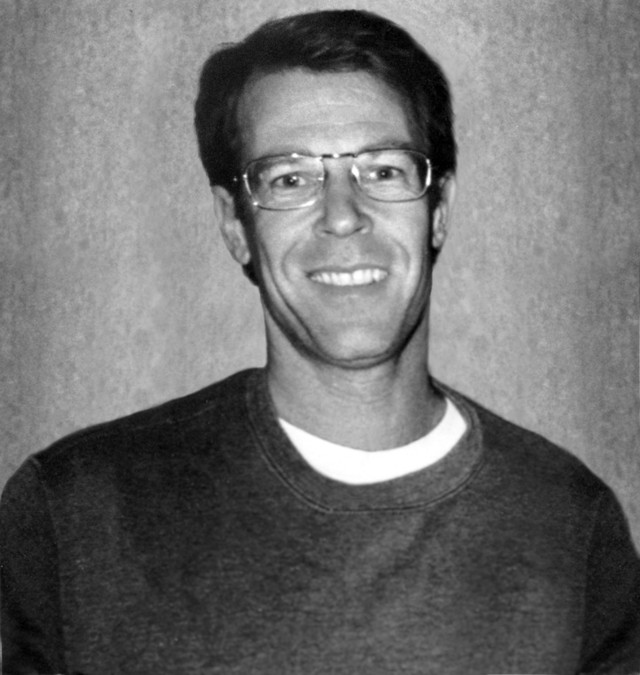
by Cassandra Willyard Friday, March 9, 2018

Kim Stanley Robinson. Credit: Gloria Robinson.
Don’t let Kim Stanley Robinson fool you. He may know a lot about the geography of Mars and ocean acidification, but he’s no scientist. He’s an award-winning science fiction novelist. Yet the science in his books is so convincing that many fans can’t help but be duped.
Robinson has been writing science fiction for more than 30 years, and climate change has been an enduring theme. His most famous trilogy, about Mars, follows scientists and engineers as they try to make the climate of the red planet more Earth-like. And his most recent trilogy — which includes “Forty Signs of Rain, Fifty Degrees Below,” and “Sixty Days and Counting” — focuses on a group of scientists at the National Science Foundation tasked with mitigating the impacts of a warming world. EARTH reporter Cassandra Willyard recently asked Robinson about his work, his devotion to scientific accuracy and his next book.
CW: What prompted you to start writing science fiction?
KSR: When I ran into science fiction there was something very familiar about it. It seemed to be describing reality the way I saw it in my own life better than the other kinds of fiction that I had already enjoyed.
CW: Who was the first science fiction author you read?
KSR: Without really knowing it, it was Jules Verne, because his books were put in the regular fiction section of my hometown library. A lot of his stuff looks like boys’ adventure fiction with exotic settings, and I didn’t really think of it as being different until later.
CW: You’re most famous for your trilogy about humans settling on Mars. Is that something you see in our future?
KSR: Yes. I think that if humanity manages to get into balance with this planet and makes a good sustainable civilization here, then going to Mars — studying it, exploring it and, over the really long haul, settling it — probably will happen. The timeline could be really long. I think it’s going to be most valuable as a study zone and an experimental space that teaches us things about how planets work — not as an escape hatch or some place we can go after blowing it here. That’s not realistic and it wouldn’t be good even if it were.
CW: Your latest trilogy is about climate change. What prompted you to tackle that topic?
KSR: The Martian books were about climate change too. That’s what terraforming is. I was thinking all along when I was writing them, “Gosh we’re already terraforming Earth except we’re going backwards and making it worse, less friendly to the current life forms.” So we need to start thinking about terraforming Earth in a positive sense. Science is so powerful in our civilization and yet it seems to be a little bit cut out of the policymaking process. Therefore, the priorities that civilization sets are sometimes not very scientific. I thought that was dangerous enough to be talked about and that a novel could bring all these things together.
CW: How much do you worry about scientific accuracy?
KSR: I try to be meticulous without being perfectionist, because you can’t achieve perfection. I began as an English major, so I don’t have a strong scientific or mathematical background. I’ve made a lot of mistakes in my novels. And what happens is people write me letters or send me e-mails and they’re either outraged or they’re amused. And so then I put the fixes in as the books are reprinted.
CW: Your wife is a scientist. Does she help you out?
KSR: Yes. She’s an environmental chemist working for the U.S. Geological Survey. She’s one of those scientists who are pretty particular about not speculating when they don’t know something. I can’t be that way, being a science fiction writer. I speculate all the time about things I know nothing about. It’s just a danger of the game. But a lot of times I’ll ask her, “What about this?” And she’ll say, “How am I supposed to know?” And I’ll say, “Well, God, you’re a scientist.” And she’ll just laugh.
CW: What’s the next book?
KSR: I’m most of the way through a novel about Galileo. It’s a science fiction novel because it gets involved in some fairly bizarre time traveling adventures. But I also want to tell his real story — what he did to push science in the direction that it eventually went. I’ll be sorry when I’m done with this book because it’s such a good project.
© 2008-2021. All rights reserved. Any copying, redistribution or retransmission of any of the contents of this service without the expressed written permission of the American Geosciences Institute is expressly prohibited. Click here for all copyright requests.